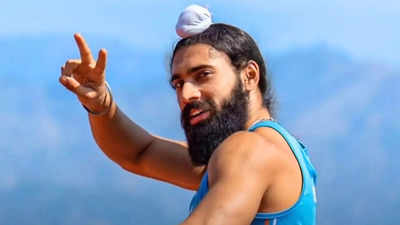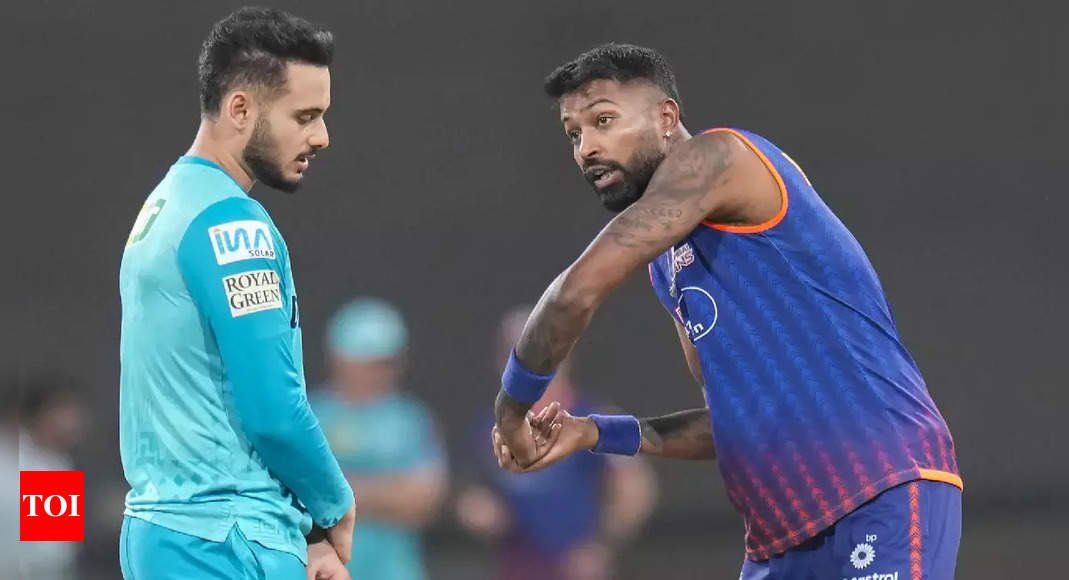NEW DELHI: Facing the unforgiving wrath of the sun at the Youth Asian Championships in 2017, a 16-year-old Gurindervir Singh stood at the starting line.
Unfazed by the magnitude of the competition and the competitors — given that he had won gold medals and set national records in almost every event he had participated in until then — the tall and muscular frame looked poised to go beyond the red ribbon and secure qualification in 100m with ease.
But destiny had other plans.
“I had the most extraordinary experience of my life,” Gurindervir tells TimesofIndia.com.
He ran the heat but barely made the cut, ranking 16th out of 16 qualified for the next round. What followed shook the sprinter.
“The coaches and other players, even my own roommate, taunted me. They said I would never win a medal, that I was lucky to be here as a ‘best loser,'” Gurindervir recalls. “That hurt me a lot.”
Broken inside, the runner skipped meals and isolated himself. Then came a call from his father, Kamaljeet Singh.
“I didn’t tell anyone at home about my situation, not even my coach (Sarabjeet Singh). When I spoke to my father, I told him that I had qualified, but I didn’t mention my rank,” Gurindervir reveals.
ALSO READ: ‘My parents didn’t want another girl, they left me to die’: First Indian to win UFC fight Puja Tomar |Exclsuive
“When my father asked me, ‘What are the chances of winning a medal?’ I told him that second or third place was possible. Hearing my reply, he got so angry and said, ‘If you have the mentality of aiming for second or third place, how will you ever come first? If you think like this, then don’t run!'”
Kamaljeet’s words ignited the fire missing in Gurindervir. In the semi-finals, he not only qualified but also emerged as the fastest runner.
By the time he reached the final, he had become a champion from an underdog. Against all odds, he won gold, becoming the first Indian to do so.
From Patial to podiums: The journey of India’s fastest man
Born in Patial, a small village in Jalandhar district, Punjab, in December 2000, Gurindervir grew up in a family where playing sports was a way of life.
His father, a national-level volleyball player, and his grandfather, a Kabaddi player who also served in the Indian Army, ensured that athletics wasn’t just an afterthought.
“My father started training me early. We didn’t have fancy facilities, but he taught me skipping, jumping, and running. I used to train barefoot,” Gurindervir pointed out.
The turning point came when he saw Usain Bolt’s record run at the 2008 Olympics. “That’s when I knew I wanted to be a sprinter,” he reveals.
At Guru Nanak Mission Public School, his first coach, Sarwan Singh, recognised his raw talent. He taught Gurindervir how to use starting blocks, introduced him to spikes, and set him on the path to professional sprinting.
Later, under the guidance of coach Sarabjeet Singh Happy in Jalandhar, Gurindervir shattered national records in the U-14 and U-18 categories.
Hitting the bull’s eye and making headlines
Last week, at the Indian Grand Prix 1 in Bengaluru, Gurindervir Singh made history in Men’s 100m, subsequently qualifying for the upcoming Asian Championship in South Korea. He clocked 10.20 seconds in the 100m race, breaking Manikanta H. Hoblidhar’s national record of 10.23 seconds.
“It’s a big achievement for me,” he says. “I had been trying to break this record for a long time. In 2020, I equaled the national record but missed breaking it by just 0.01 seconds.”
Hoblidhar improved his time to 10.22 seconds but finished second, while Amlan Borgohain came third.
All three athletes train at the Reliance Foundation High Performance Centre, where Gurindervir has been working under the supervision of James Hillier since September 2024.
The hurdles on the track
The road to the national record, however, has been far from smooth. Gurindervir battled severe health issues between 2022 and 2023.
“I was staying away from home. The food wasn’t nutritious in the sports hostel in Punjab. I tried cooking for myself but didn’t get enough time after doing it for one and one-and-half months. So I started eating outside, but that wasn’t ideal either. My coach Happy sir arranged for free meals at a restaurant, which helped for a while, but then I realised the food wasn’t healthy enough,” he stated.
“Our hostel was very old, its water tank had contaminated water, no one used to clean it, and no one cared about it. The poor water quality at the hostel made things worse. I even got my own water filter, but it didn’t help much. My gut lining got damaged. The mucus in my large intestine got thinner, and I started experiencing issues like severe weakness. During an inter-state competition in 2022, due to severe diarrhea and vomiting, I lost 10-12 kg in just 8-10 days.”
Despite multiple treatments, including medicines and Ayurveda, nothing worked: “It was one of the most depressing times of my life. I couldn’t sleep, and my body was giving up.”
The turning point came when his coach recommended a mushroom-based supplement that helped his digestion. By 2024, he had recovered almost fully.
“Slowly, my condition stabilised. I won gold in the Federation Cup and Inter-State Championships and joined Reliance in September 2024. With better facilities, I fully recovered,” he adds.
The harsh reality of Indian athletics
Despite his success, Gurindervir is painfully aware of the financial struggles in Indian athletics.
“Every athlete wants to win medals for their country and see their national flag raised. But then there’s the financial aspect. A sports career lasts only 10-20 years. If an athlete doesn’t become financially stable in that time, then what is the use of the medals? Future generations won’t be motivated if they see athletes struggling financially,” he remarks.
“I didn’t start with the goal of getting a job. My goal was always to win medals. A job alone wouldn’t satisfy me. But my senior athletes, who had played in the Asian Games, told me that in India, there aren’t enough facilities, funding, or even proper diet support from the government,” he sighs. “They advised me to take a job if I got an offer because you never know what might happen — an injury could end your career, and then you’d be left with nothing. That’s why many athletes end up taking jobs. But the problem is that once they start working, they can’t train properly.”
Get the latest IPL 2025 updates on Times of India, including match schedules, team squads, points table and IPL live score for CSK, MI, RCB, KKR, SRH, LSG, DC, GT, PBKS, and RR. Don’t miss the list of players in the race for IPL Orange Cap and IPL Purple cap.




